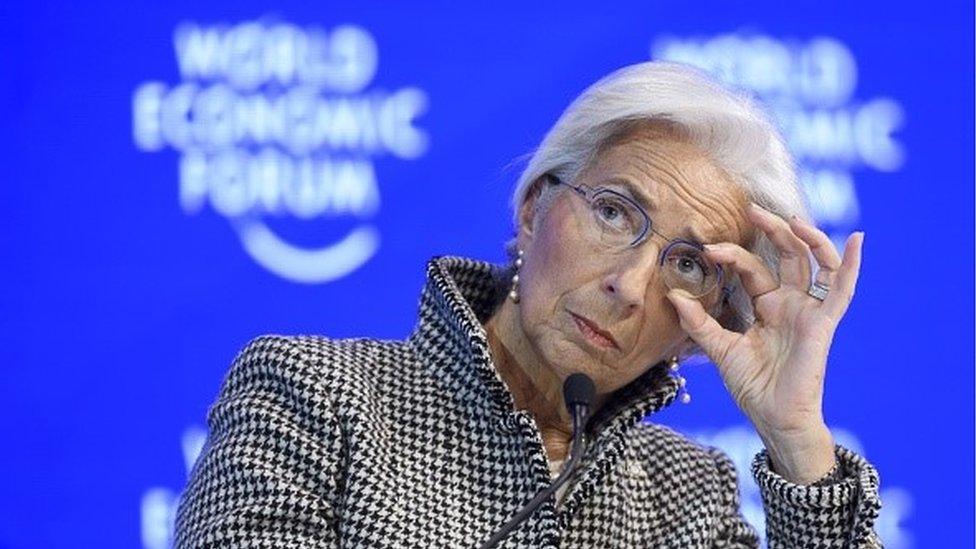Lagarde warns UK of pain ahead as Brexit approaches
- Published
- comments

The head of the International Monetary Fund has warned the UK there is still likely to be "pain" ahead as Theresa May prepares to trigger the UK's departure from the European Union.
Christine Lagarde told the BBC the Brexit process would be complicated.
She said that although the UK economy had performed more strongly than the IMF had predicted, uncertainty over the terms of the deal "is always a risk".
Any deal with the EU will "not be as good" as membership, she said.
"When you belong to a club, whatever that is, the members of the club have a degree of affinity and particular terms under which they operate," Ms Lagarde told me at the World Economic Forum in Davos.
"Someone outside the club has different access."
I asked her if she agreed with the Prime Minister of Malta, Joseph Muscat, that any future UK/EU agreement "necessarily needs to be inferior to membership".
Malta presently holds the rotating presidency of the EU.
Clarity
"If being part of a club is optimising and leveraging your membership [leaving the club] would not be as good, yes," she said.
Ms Lagarde welcomed the prime minister's speech on Tuesday - saying that Britain wanted to leave the single market - for providing clarity.
"Better clarity, less uncertainty is certainly better for the UK economy and for the rest of the European Union," she said.
But she warned that there were still many questions to be answered.
"The terms under which the [agreement] will be facilitated, over what period of time - question mark," she said.
"Over what kind of transition period - question mark.
"It is only when those questions are better clarified that we will understand how the UK economy is going to pan out.
"We are still of the view that it will not be positive all along and without pain."
Downside risks
Before the referendum result, Ms Lagarde said a vote to leave the EU would have consequences ranging from "quite bad to very, very bad".
Since the referendum, the UK economy has performed strongly and the IMF has admitted that it was too pessimistic.
Earlier this week, the IMF upgraded Britain's growth forecast for 2017.
I asked Ms Lagarde if her "quite bad to very, very bad" analysis was wrong.
She said that the Bank of England's decision to cut interest rates after the referendum had supported the economy and that consumers had remained far more confident than expected.
But she said that there were still downside risks ahead.
"Once uncertainty clears and if people feel that their ability to set up shop in the UK and their ability to operate throughout the geographical area that is the European Union is not working as well as it did - the investment decision will change.
"In the same vein, if exports are subject to significant tariffs, restrictions and so on, the ability of the UK to activate that trade engine is going to be reduced.
"So while we have upgraded our forecast for 2017, we have downgraded for 2018."